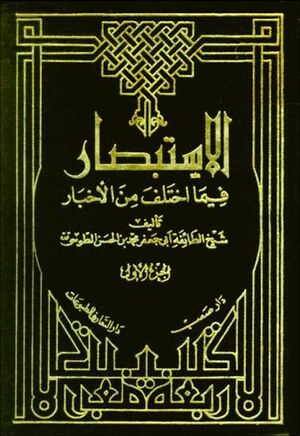Discription of This Book
This book contains jurisprudential hadiths and is more concise than Tahdhib al-ahkam. The order of the chapters in al-Istibsar is so that the first two parts are dedicated to issues regarding worship (except Jihad) and the last part (part three) is about other jurisprudential issues such as contracts, unilateral obligations, fixed punishments, and financial compensations.
According to statistics that the author has given about the hadiths recorded in al-Istibsar, they are 5511 hadiths,[1] while in a researched publication of the book, the number of hadiths is 5558 and this difference might be due to the way of counting some special hadiths.[2]
In the first two parts, al-Shaykh al-Tusi has recorded almost all hadiths with their references. Still, in the last part, the references are mentioned in a brief way and similar to the style of Tahdhib al-ahkam and more similar to the style of al-Shaykh al-Saduq in Man la yahduruh al-faqih the references of hadiths to hadiths Usul [original references] are mentioned at the end of the work.
General Data
The full information of the hadith is given below
Author
<p dir="ltr" style="text-align:justify">Muḥammad b. al-Ḥasan b. ʿAlī b. al-Ḥasan (Arabic: <span dir="RTL">محمد بن الحسن بن علي بن الحسن</span>) (b. 385/995 in Tus, d. 460/1067 in Najaf), better known as al-Shaykh al-Ṭūsī (Arabic: <span dir="RTL">الشيخ الطوسي</span>), was one of the greatest Shi'a jurists and compilers of hadith. He has written many works in the fields of theology and tafsir. For his great contributions and tremendous influence, he received the honorable title of al-Shaykh al-Ṭāʾifa (<span dir="RTL">الشيخ الطائفة</span>) (the chief or head of the Shi'a).</p>
<p dir="ltr" style="text-align:justify">He moved from Khorasan to Iraq at the age of 23 and benefited from teachers like al-Shaykh al-Mufid and al-Sharif al-Murtada. The Abbasid caliph appointed him to the chair of Theology of Baghdad. When the library of Shapur was set on fire, he had no choice but to move to Najaf and establish a seminary there. Al-Shaykh al-Tusi became the marja' of the Shi'a after the demise of al-Sharif al-Murtada.</p>
<p dir="ltr" style="text-align:justify">His jurisprudential theories and writings such as al-Nihaya, al-Khilaf and al-Mabsut are consulted by jurisprudents. His important exegesis is al-Tibyan. Al-Shaykh al-Tusi was also an expert in other fields such as rijal, theology and principles of jurisprudence and his books are references for religious studies. He started to transform Shi'i ijtihad and expanded its discussions and made it independent from Sunni ijtihad. His most famous student is Abu l-Salah al-Halabi.</p>



